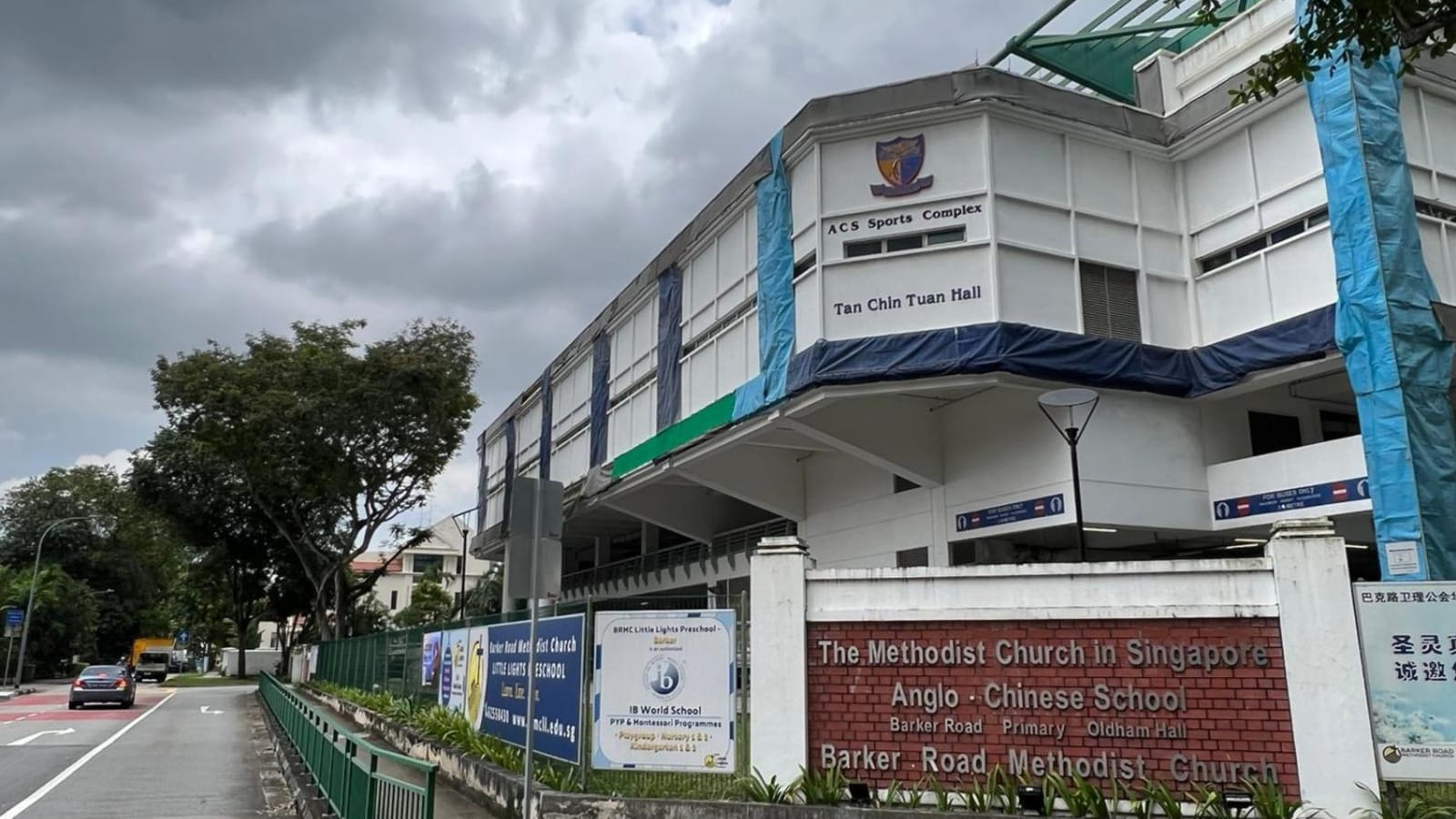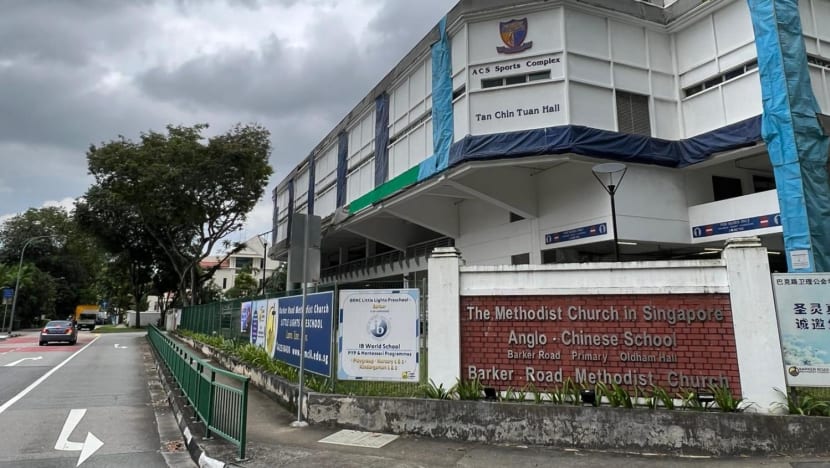
Advertisement
Currently, almost half of the students in ACS schools have alumni parents, said one former student.

File photo of the ACS Barker Road campus, which houses ACS (Primary) and ACS (Barker Road), a secondary school. (Photo: Tan Si Hui)
SINGAPORE: The move to welcome female students to Anglo-Chinese School (Primary) and relocate it to Tengah was met with mixed reactions from alumni and parents alike.
Mr Michael Lee, who has two sons who graduated from ACS (Primary) and are now in secondary school, noted that the move would allow the school to expand into a different area of Singapore.
“If you look at it, the ACS (Primary) and ACS (Junior) are very close together. So if you have another school in a different area, you can serve a different part of the community,” he said.
“And I thought that over the years, ACS was getting very exclusive. Not many people from different backgrounds and experiences can join the school, so I think it’s good to move to a different school and also accept girls.”
Mr Lee is an alumnus of ACS (Primary), having graduated in 1988.
ACS (Primary) moves to Tengah
The Ministry of Education (MOE) announced on Thursday (Feb 9) that ACS (Primary) will move from Barker Road to Tengah and accept female students from 2030.
The new location at Tengah will be more than 12km away from the school’s current site at 50 Barker Road, located in the affluent Bukit Timah residential estate.
All Primary 1 cohorts of ACS (Primary) admitted to the school until 2029 will remain at the Barker Road site until they graduate. When the Tengah site opens in 2030, it will accept both male and female siblings of existing students of the Barker Road site for Phase 1 admission.
From 2030, the school at Barker Road will only accept male Primary 1 students who are siblings of students currently studying at the site, said the Education Ministry.
Cohort sizes at the Barker Road ACS (Primary) site will gradually fall, the ministry noted. Tentatively in 2033, the school will consolidate with ACS (Junior) at the nearby Winstedt Road, and operate under the ACS (Junior) name.
The new ACS (Junior) will then operate from both campuses before shifting all operations to the Barker Road site around 2039.
Collapse Expand
The school management had long discussions on which primary school to relocate, and a key factor was whether the facilities could be expanded, said chairman of the ACS board of governors Mr Richard Seow.
“ACS (Primary) is actually the smaller school, so ACS (Primary) would allow for a bigger expansion of the school,” he said. ACS (Primary) currently has about 240 students in each cohort, while ACS (Junior) has about 270 students per cohort.
The school’s gifted education programme (GEP) was also a deciding factor, said Mr Seow. “We thought that it would be good that our GEP school would go to Tengah.”
ALUMNI NOT CONSULTED
But Mr Adrian Wee, a parent of two sons who are in Primary 3 and Primary 6, questioned why the move was made without consulting parents and alumni more thoroughly.
“I want to be very clear, I don’t think it’s a bad thing. But it’s a change, and it should have gone through a period of consultation,” he told CNA.
“Whatever the reasons there are for this, I can’t disagree with them … But any time you’re going to change the actual character of the school, I think the stakeholders and alumni deserve to be consulted.
“And I also think that the reason that they didn’t do so, is because they knew it would be unpopular.”
Instead of moving ACS (Primary) to Tengah, the management could have set up a new ACS school in Tengah, just like how the co-ed ACS (International) was set up, he shared.
“Essentially, what this would mean is that the ACS (Primary) as we know it will cease to exist. And they can say it’s the same school except that it will have girls, but we all know … it’s a fundamental characteristic of the school. And even a change for the better deserves (to go through) consultation.”
Mr Wee is an ACS (Primary) alumnus, while his father, grandfather and great-grandfather are also ACS alumni.
“We give preference to children of alumni because the thinking is that parents have contributed in some way, shape or form. So if the parents have contributed … then I think the parents need to be told, they need to be consulted about things like this,” he said, stressing that the ACS alumni is a community.
“NOT POSSIBLE TO BRING IN EVERYONE”
The decision to move to Tengah was officially made at a board meeting on Tuesday night, said Mr Seow, in response to a question about why parents were not consulted on the matter.
“I think when you look at schools … you do not want material price-sensitive information out. You want to basically have all the facts done. It was not possible to bring in everyone before the decision,” he added.
Representatives from the board of governors and the Old Boys’ Association were included in the discussions, and they were told that this would affect housing prices, he stressed.
There were concerns about the new school being located further away in Tengah, as well as the change from a boys’ school to a co-ed school, said the president of the ACS Old Boys’ Association Lock Wai Han.
“I think we sought very hard to make sure that we can minimise the disruption to existing students in the school, so that parents and students who are in the schools today are not inconvenienced.”
Software engineer Chia Ming En echoed Mr Lee’s thoughts on exclusivity, and noted that the ACS family of schools are “well-known for elitism”.
“People brag that they’re from AC. And it doesn’t help as well that ACS schools happen to be in a very rich area,” the 28-year-old said, adding that ACS students usually mix with students from other elite schools in the area.
“It’s not very good, these kids grow up and they may not be able to identify with people from lower social classes, and I have experienced it myself,” said Mr Chia, who went on to study at ACS International after leaving ACS (Primary).
“(Leaving the school) made me realise that I never really had friends of other races at all. And because my English was so good, I never really hung out with people who were not as privileged as me to go to a named school.”
After its move to Tengah, students who enrol in ACS (Primary) will get the chance to meet students from different backgrounds, he added.
“I think there will still be a perception that ACS is an elitist school, but it will lessen the extent of elitism because people will be able to identify more with different backgrounds and things like that.”
In his time, it was easier to get into the ACS schools without affiliation, said Mr Lee. But now, almost half the students have alumni parents.
“It’s getting more and more exclusive, which is not a good thing.”
CO-ED MOVE WELCOME
Parents and alumni CNA spoke to welcomed the move to make ACS (Primary) a co-ed school.
There are also alumni members who only have daughters, and are currently unable to get their children a place in the ACS family through the alumni route, said Mr Lee.
However, he proposed that the distinction between ACS (Primary) and ACS (Junior) be waived for alumni affiliation.
For example, this would allow an alumnus of ACS (Junior) to send their daughter to ACS (Primary) if they wanted to.
“I think this gives the flexibility to both ACS (Primary) and ACS (Junior) alumni.”
Mr Chia shared that when he went to secondary school at ACS (International), he found it awkward when interacting with female classmates, and that many of his friends from single-sex schools had similar experiences.
“We actually had a lot of difficulties because for the first time in our lives, we’re going to school with these people and we have no idea how to talk to them … It was very jarring and disorientating,” he added.
“Coming from a same-sex school stunted my social growth to an extent because I had no idea how to relate to people, and that led to some very embarrassing encounters in ACS (International).”
Mr Chia also welcomed the opening of the special education needs school at the Tengah site. In ACS (Primary), he was enrolled in the supplementary class for students with learning needs, and he has since been diagnosed with adult attention-deficit hyperactivity disorder.
“I feel like if you’re going to take these people out and put them in a special school, you need to be able to afford them to ACS brand of education, while also being a lot more inclusive,” he said, adding that the combined site would help to integrate the students better.
The response from parents and alumni so far has been “overwhelmingly positive”, especially regarding the special education needs school and its location in the Tengah neighbourhood, said Mr Seow.
“There will be some negative comments, but negative comments that I’ve heard thus far, have been from the lack of understanding,” he added.
Responding to a question about turning ACS (Primary) into a co-ed school, Mr Seow acknowledged that he personally had some initial hesitations about the decision.
“If you talk to people (of) my generation, we’re very used to being from a boys’ school,” he said.
“But I think if you look to the younger generations, my sons, they said, ‘Why not? These are good things.’ This is the time that we’re in, and we should be accepting and we should change.”


